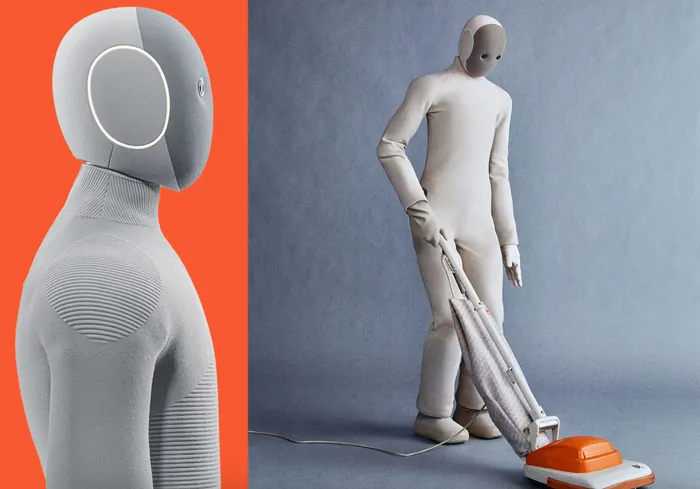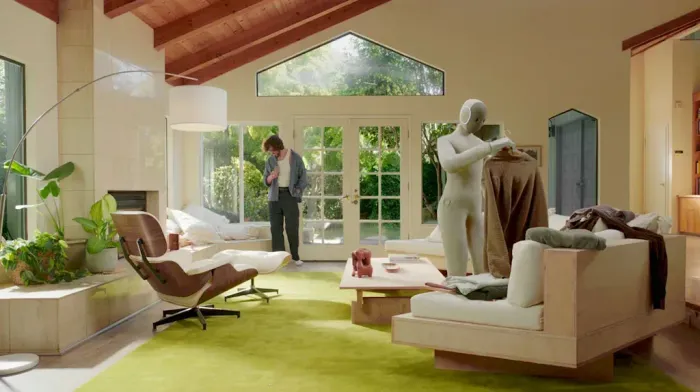
.
Image: Courtesy of 1X Technologies/Eli Russell Linnetz]
With one sweeping gesture, Dar Sleeper hoists the humanoid robot off the ground. Bracing its back with one arm and its legs with the other, he gently carries it across the room and lowers it onto a sofa, where it lies in repose as if catching a quick nap.
It’s a slightly surreal scene, but it has a serious point. I am visiting the Palo Alto headquarters of 1X Technologies, and Sleeper, the company’s VP of growth, is demonstrating that Neo, its home robot, is lightweight at a mere 66 pounds. That’s a crucial design feature, given that a weighty domestic bot could prove hazardous if it toppled over in the vicinity of a human, a pet, or just a pricey vase.
Soon, Neo will take on the ultimate proving ground for a home robot: actual homes. 1X is announcing that it’s taking preorders and plans to ship units to its earliest customers next year. The price is $20,000, or $499 per month as a subscription service, with a six-month minimum. Like a smartphone, the robot will come in multiple colour options—tan, gray, and dark brown.
Wait, $20,000? There isn’t much precedent for mainstream consumer products in that price range. Cars, of course. (The average price for a new one just topped $50,000.) Maybe boats? Even if you can come up with another example or two, it’s a short list.
Then again, 1X founder and CEO Bernd Børnich’s goals for his robots involve attaining a degree of utility that few inventions ever have. He wants to teach Neo to handle every household task that people perform because they need to, not because they want to. Even if the time saved came in bits and pieces—five minutes of dishwasher unloading here, 15 minutes of laundry folding there—it would add up to many hours newly available for more rewarding pursuits.

.
Image: Courtesy 1X Technologies
Now multiply that by hundreds of thousands of Neos, which is the quantity Børnich talks about when outlining 1X’s long-term plans for manufacturing capacity. “Potentially it’s the biggest thing ever, with respect to productivity increase across society,” he tells me when I catch up with him via Zoom after my visit to the company.
Børnich is hardly the only entrepreneur spinning visions of a world in which humans coexist with teeming masses of robots modelled on them. Companies such as Agility Robotics, Apptronik, and Figure AI are all building humanoid bots of their own. So is Sleeper’s former employer, Tesla, whose Optimus robot has seemingly diverted much of Elon Musk’s attention away from boring old EVs. Most of the nascent category’s focus is on environments such as factories and warehouses, where robots might take on jobs that are dangerous or repetitive—no paychecks required. (1X is presently focused on the home but says it “plans to offer humanoids for the workplace at a later date.”)
It’s not just robotics manufacturers that see a vast business in the making. Humanoid bots could fuel enormous growth in chips, foundational models, cloud services, and other elements of the AI economy—a wave of optimism 1X is already riding. In 2023, OpenAI led the company’s $23.5 million Series A2 funding round; its Series B round the following year raised another $100 million. The company also has a strategic alliance with Nvidia, whose CEO, Jensen Huang, accepted a custom leather jacket from Neo during an onstage appearance last March.
By 2050, according to a May Morgan Stanley report, there could be more than a billion humanoid robots in service, with the vast majority in commercial and industrial settings. Only 80 million would be in homes, the report speculates. Still, that’s roughly 80 million more humanoid home robots than exist today.
This article has been edited...if you would like to read the entire article, click here!
ABOUT THE AUTHOR
Harry McCracken is the global technology editor for Fast Company, based in San Francisco. He writes about topics ranging from gadgets and services from tech giants to the startup economy to how artificial intelligence and other breakthroughs are changing life at work, home, and beyond.
FAST COMPANY
